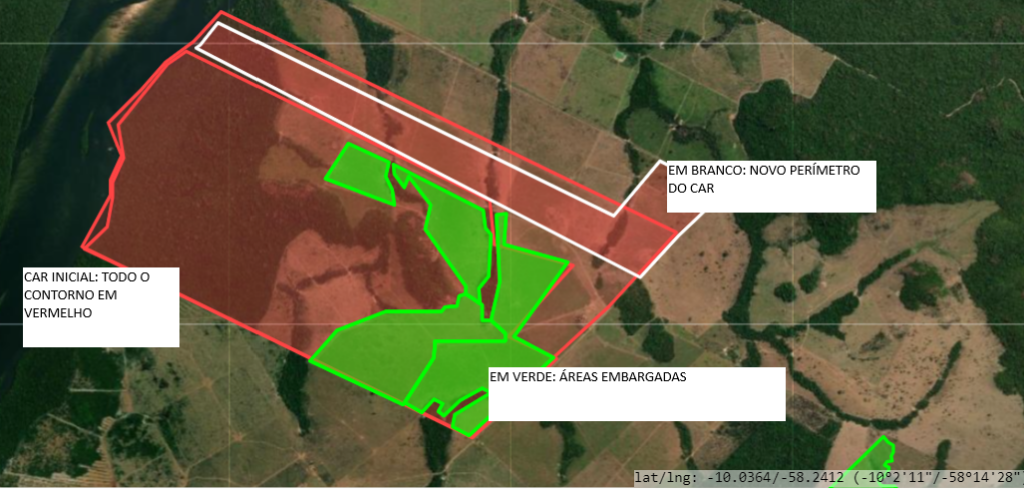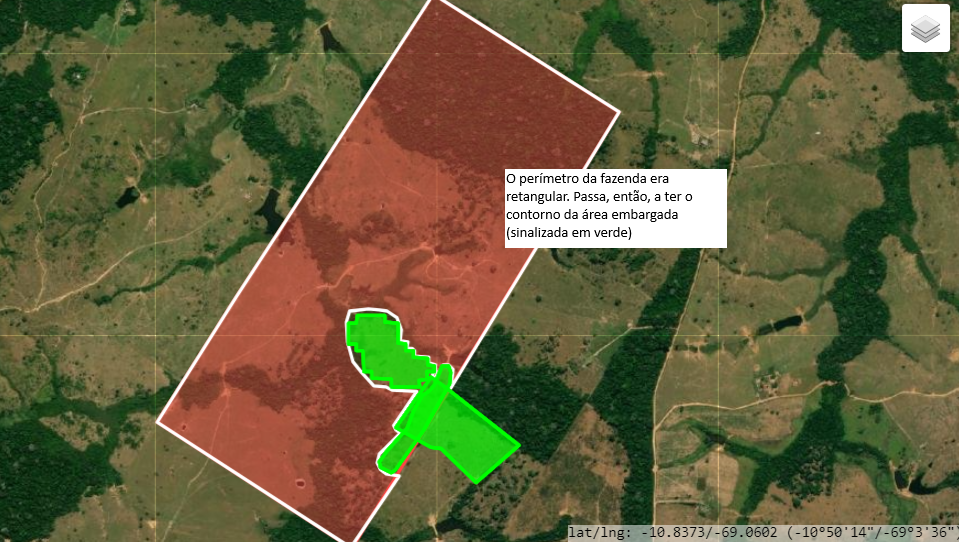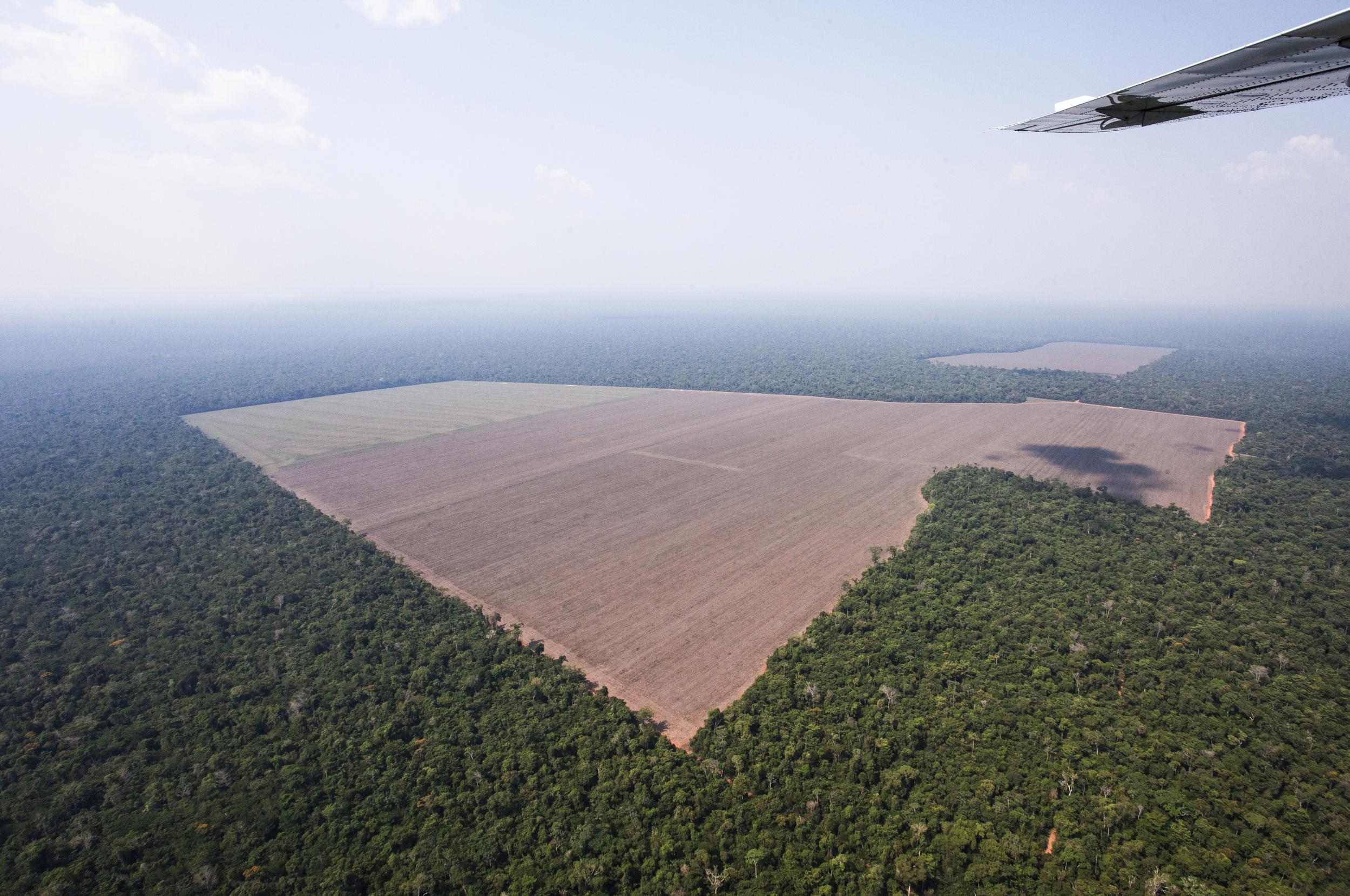THE FAZENDA PAI HERÓI (Father Hero farm), located in Nova Bandeirantes (MT), in Brazil, changed its declared perimeter in the Rural Environmental Registry (CAR) twice between 2020 and 2023. In the latest change, the property, which previously occupied a large area on the map, became outlined in a narrow corridor (see image below). The change excluded from the declared perimeter environmental interdictions that had previously overlapped the farm. Between 2015 and 2016, rancher Waldemar Dallago, the owner of the property, had 208 hectares interdicted by the Brazilian Institute for the Environment and Renewable Natural Resources (Ibama) for any kind of farming production for deforesting the Amazon without authorization—an area equivalent to 208 football fields.

Despite the interdictions still being valid, Fazenda Pai Herói supplied cattle to JBS in 2024, according to Animal Transit Guides (GTAs) accessed by Repórter Brasil. A giant in the sector, JBS is a signatory of the TAC da Carne and the Public Commitment to Meat, and it is also part of the Boi na Linha program—initiatives for a sustainable supply chain that stipulate that slaughterhouses should not buy from farms with interdicted areas due to environmental crimes.
After questioning from Repórter Brasil, JBS informed that it “preventively blocked the property.” Read the full response here.
Fazenda Pai Herói also obtained two rural loans from Banco do Brasil—the largest Brazilian retail bank—in 2024, using resources from the Constitutional Fund for Financing of the Midwest (FCO), created in 1988 to promote the development of the Midwest region of the country by fostering business owners and rural producers.
Both loans remain active. Under Central Bank rules, properties with interdicted areas cannot obtain financing from public funds. When consulted about the change in the declared area of the farm in the Rural Environmental Registry (CAR)—a type of public record mandatory for all rural properties—Banco do Brasil stated that it does not comment on specific cases, “in respect of banking secrecy.”
The Mato Grosso State Environmental Department said it “identified data manipulation and is in the process of sending the documents to the Environmental Police Department for investigation of fraud-related conduct, and it will promote the relevant sanctions.” The case of Fazenda Pai Herói is one of those identified by the Center for Climate Crime Analysis (CCCA) in a study released today. The study identified 15,750 alterations in the perimeter of private properties declared in CAR between 2020 and 2024. These changes made 4.9 million hectares disappear from the declared perimeter of private properties.
Com os perímetros do CAR alterados, fazendeiros conseguem “apagar” restrições ambientais de suas terras e driblar a legislação. Eles continuam comercializando com grandes frigoríficos e obtendo financiamentos milionários porque, no cadastro, suas áreas não apresentam pendências.
By altering the declared perimeters, farmers can “erase” environmental restrictions on their lands and bypass legislation. They continue to trade with major slaughterhouses and secure million-dollar loans because, in the registry, their areas show no pending issues.
Among the properties mapped by the CCCA, Repórter Brasil identified four cases where the erasure of interdictions preceded rural loans, based on cross-referencing data from embargoed areas overlaid on altered CARs and data from the Rural Credit Operations System and Proagro (Sicor).
“Banks and slaughterhouses must create databases with the history of changes in CAR registrations so they can conduct this monitoring,” recommends Heron Martins, coordinator of the CCCA’s geotechnology lab.
‘Usual’ practice
Paulo Rogério de Oliveira, Dallago’s lawyer, told Repórter Brasil over the phone that this type of practice is “usual.” “He [Dallago] was advised by an engineer to try to alter, swap the CAR because slaughterhouses, as a rule, are not allowing the slaughter of animals supplied by properties that have environmental interdictions or anything like that. Slaughterhouses do not recognize, for example, if a 1,000-hectare fam has an interdiction of only 10 hectares,” said the lawyer.
For the rancher’s lawyer, “this all stems from absurd demands from financial institutions and even slaughterhouses.” He justified that the interdiction being on part of the farm and the entire property being blocked ends up “putting the person in an irregular situation.” The lawyer said he would send additional information on the case via email, but no new response was received until the publication of this report. The space remains open.
Farm ‘moves’ 44 kilometers in CAR alteration
In Pará, a state that accounts for 60% of CAR alterations due to deforestation mapped by the CCCA study, the Fazenda Dois Irmãos (“Two Brothers Farm”), in Anapu, not only changed its perimeter in the registry but also moved the property, on paper, to another location.
In 2016, its owner, Nacime Pereira Fernandes, was fined for illegal deforestation by Ibama, which interdicted 21.34 hectares of the farm—the equivalent of 21 football fields. After this, the farm’s location was altered. The CAR placed the farm approximately 44 kilometers from the originally declared area. Later, a new change removed deforestation records mapped by the Amazon Deforestation Calculation Program (Prodes) from the farm’s perimeter.
In 2024, the owner obtained two rural loans from Sicredi and Banco da Amazônia, both using resources from the Northern Constitutional Financing Fund (FNO), classified by the federal government as “one of the main instruments of financing the National Regional Development Policy (PNDR).” Both loans remain active.
Contacted by Repórter Brasil, Fernandes, through her lawyer, declined to comment on the case.
Sicredi stated that “a rural credit operation linked to the cited CAR registry occurred in 2024 in full compliance with the Rural Credit Manual [MCR], following a detailed analysis of the area’s socio-environmental conditions, which, to date, remains in regular status.” Banco da Amazônia also justified that the loan was “in accordance with the regulations in effect at the time of contracting.” Asked about monitoring CAR alterations and the identified case, Pará’s Environmental Department said it is investigating the case and that it “constantly analyzes registries on CAR’s database.”
In Acre, farmers ‘bypass’ interdictions
Fazenda Agropecuária Alvorada III, in the municipality of Brasiléia, Acre, is another that modified its CAR declaration after two interdictions for deforestation were registered within its area in 2007 and 2012. The property initially had a rectangular shape in the declared CAR area. After 2021, the CAR perimeter changed. A curve adjusted the boundary to exclude the Ibama interdiction.

After the “erasure” of the environmental restriction, in July 2024, Mayk Willi Reis, who registered the CAR as the landowner, obtained a rural loan from Banco do Brasil. The loan remains active. The financial institution stated it does not comment on specific cases, “in respect of banking secrecy.”
In Colônia Boa Esperança, in Sena Madureira, Acre, a similar situation occurred. In 2015, Raimunda Santiago da Silva was fined for illegal deforestation and had 8.3 hectares of her farm interdicted by Ibama. The property had already been subject to a three-hectare Ibama interdiction in 2007, under another person’s name, but within the same colony. Subsequently, the CAR area was altered, repositioning the property to the right, with the perimeter skirting the interdiction.
In June 2024, the property obtained financing from Banco da Amazônia, using FNO resources. The bank stated that “the interdictions became public after the loan was granted” and that “the bank is following the guidelines established in the Rural Credit Manual (MCR) to address similar situations, ensuring compliance with current environmental legislation.”
Heron Martins, from CCCA, highlights the importance of analyzing each case identified in the study: “All cases must undergo deeper investigation to identify other elements. This way, it becomes clear that the change had a more specific goal. It is necessary to delve into this to determine whether the CAR declaration should be canceled.”
Repórter Brasil attempted to contact Silva’s lawyer but received no response. The report could not reach Mayk Willi.
When questioned, Acre’s Environmental Department did not provide responses regarding monitoring of CAR alterations and the identified cases by the time this report was published. The space remains open for future statements.
Banking regulations
The Central Bank’s Rural Credit Manual prohibits financing for properties included on Ibama’s public interdiction list and stipulates that if embargoes occur in the area after the loan is granted, the contract may be terminated.
For Martins, it is necessary for institutions to monitor properties. “One of our recommendations, both for financial institutions and for buyers of cattle and soybeans, is that they assess the history of the CAR declaration. They, who are so efficient at evaluating elements to generate credit, need to evaluate the histories as well,” he emphasizes.
Banco do Brasil, Sicredi, and Banco da Amazônia reported that they monitor the environmental records of rural landowners and follow the Rural Credit Manual. Read the full responses.
Repórter Brasil also questioned the Central Bank about the four cases of loans after interdictions and CAR alterations were identified, but the institution had not provided a statement by the time this report was published. The space remains open for future comments.
Leia também


